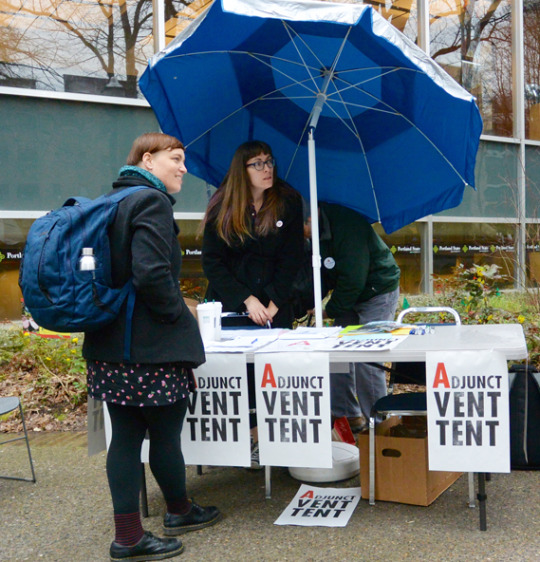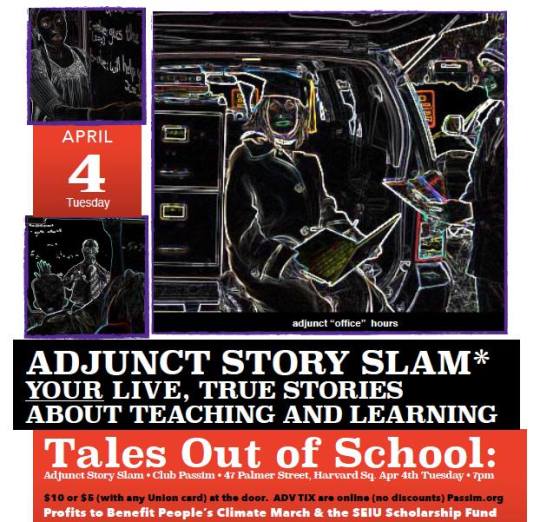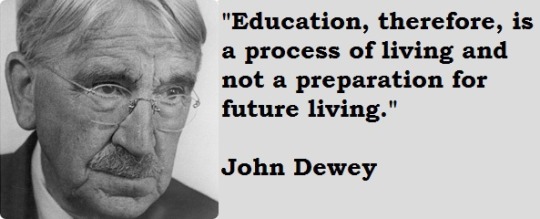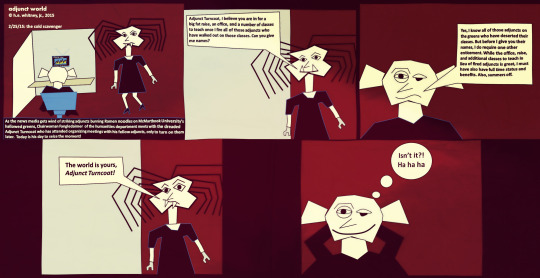Text
Reflections on #AdjunctStories, the genre

First came the academic novel, not exclusively or even mostly about guest workers in the Groves of Academe. Actually, Latin carmina burana and Chaucer's Clerke preceded them -- unless you want to go all the way back to the story of Akademus and how he got his Grove on.
Then came the adjunct story -- narratives burgeoned into documentary films, novels, plays. Leaving Academia narratives have emerged as a subgenre of the subgenre.
Syndi Dunn's December 2013 Why So Many Academics Quit and Tell seems to have introduced the #quitlit tag as well as a spreadsheet collecting stories. Referring to Matt Welsh's 2010, Why I'm leaving Harvard, Dunn comments,
When Welsh took to the Web to make his announcement, he was ahead of the curve. But he’s now in good company: Recently, there’s been a surge of cathartic columns in which scholars—with tenure and without—explain why they’re leaving academia. (We've listed the essays we've read here in a Google Doc; take a look and add pieces we've missed.)
There’s nothing new, of course, about academics leaving the ivory tower. But the exploding genre of “Quit Lit” demonstrates that saying goodbye is becoming an increasingly public act.
A recent entry by a PhD student, obviously not yet quit but apparently thinking about it -- perhaps the birth of new genre: pre-emptive quitting
How #QuitLit Became a Genre in These 9 Headlines, Amy Leggette, March 25, 2014, digi-flânerie

Some adjunct stories repositories:
The Adjunct Blog | Adjunct Project
Tell Your Story | Adjunct Action, a Project of SEIU
On Daily Kos, 2009, Professor Smartass asks What's it like to be higher ed adjunct faculty? Tell your story
The Invisible Adjunct, possibly the one who started it all, is gone -- even the from The Wayback Machine -- but her memory lingers on
PS the “vent tent” is from #NAWD in San Diego, 2015, and Adjunct Stories Slam is for a Faculty Forward event 4/4/2017
#adjunct-stories#personal narrative#confessional#bearing-witness#genres#faculty-novel#adjunct-novel#subgenres#quilit
1 note
·
View note
Photo

from the #precarity tales draft vault. a 2015 (ex) #adjunct #quitlit story: “nine years and counting” by professor never, an ex-academic alive in the real world (plus updated follow up below).
Next May, it will have been 10 years since I last stood in front of a room full of college students to share my thoughts about books. In July 2006, a few months after I taught my last class, I published a short piece about quitting academe in The Chronicle of Higher Education called Not Slinking Away. I saw the piece as the end of a memoir I was writing about my experience as an adjunct professor of English. I couldn’t yet see it was actually the beginning. Since then, I have made a version of that article into the Prologue of my book....That I might still be fiddling with an unpublished draft nine years later never occurred to me
....So what’s enough time? How does this story end? And why publish it now?
The blog, last updated November 2016 with an enigmatic post that seemed to have a ring of finality about it, could hold answers to the first two questions: ”just finish it already!” appeared September 2014, a page about the quitlit memoir -- with links to excerpts explains explains more, and then ”a writer” September 2016.
It turns out I went to graduate school to become a writer. It’s so obvious now.... I would try to work from home as a freelance writer/editor. I could do my creative projects on the side. I wrote about the culmination of this decision two years ago in the post: the perfect job: life after academe....Over the course of the years since, I’ve gradually replaced tutoring clients with writing/editing clients. It turned out I needed that Ph.D. after all (and the tutoring experience too). I write for organizations that produce scholarly information in special education and health. I couldn’t do the work without my experience as a scholar....All of that and I get paid well too.
It takes as long and as many steps as it takes. Why now? Because it “spoke” to me when I saw it in drafts, but perhaps even more because I am going through steps of my own. Not leaving academia: been there, done that. My own blogging and social media activity has been moving away from a formerly, near exclusive adjunct focus. I don’t want to stop blogging but need to find my own voice again.
7 notes
·
View notes
Photo

#AdjunctStories: Violinist, CCM graduate and former #adjunct #faculty member must leave U.S
2 notes
·
View notes
Photo

#Adjuncts' Stories of Job Insecurity | @PSC_CUNY. Updated January 24, 2014
PSC’s work to improve working conditions and job security for CUNY adjuncts received prominent coverage this week in the New York Times and NBCNews.com. In the NY Times, see “Crowded Out of Ivory Tower, Adjuncts See a Life Less Lofty” by Rachel Swarns, author of a column called The Working Life. On NBCNews.com, see“Class divide on campus: adjunct professors fight for better pay, benefits” by Nona Willis Aronowitz.
Job security for adjuncts is a priority demand for the PSC in the current round of collective bargaining for a new contract. The stories (submit yours at psc-cuny.org/JobSecurity) are being collected to support a campaign for adjunct job security. They may be shared anonymously with media, reported in testimony or offered to inform the contract negotiations.
3 notes
·
View notes
Photo

via @SeattleMag | @SeattleU #adjunct struggled to balance dreams of #teaching w/ #lowwages
In the waning hours of last December, David Heller had dinner with friends at a neighborhood Thai restaurant. Over shared plates of pad kee mao and panang curry, they drank red wine and talked of plans for the coming year. Spirits were good. Yet Heller’s friends were worried about him. He looked pale, walked with a limp, complained of sores on his legs and general fatigue. And his normally acute mind seemed distracted. When he missed their annual New Year’s Eve gathering, his friends urged him to check himself into a hospital. He hesitated, but agreed to be taken to Virginia Mason Medical Center the next day. He died early in the morning on January 2 of complications from an untreated thyroid condition.
2 notes
·
View notes
Photo

Revisiting a classic: #ClassStruggle - 2014 Ira Basen documentary | @CBCSunday
It is a black mark on the ivory tower, a story of insecurity, fear, jealousy, thwarted ambition, poverty and inequality. And it's a reality that university presidents, and many professors, don't like to talk about.
Universities in Canada - which threw open their doors this week to almost a million undergraduates - are propped up by a huge army of part-time teachers, who are highly qualified and poorly paid. They have no job security or pension, and little hope of ever getting a full-time position. They go by many titles: sessional lecturers, contract academic staff, adjunct faculty.
Listen to their story, http://www.cbc.ca/radio/thesundayedition/class-struggle-documentary-1.2756899
1 note
·
View note
Photo

A part-timer comes to realize that she is neither incompetent nor insane: ❝How to Be an #Adjunct (and Also a Cliché)❞ « @Chronicle
3 notes
·
View notes
Text
#Adjunct Across America, Interview 3…
"If Only John Dewey Could See Us Now": A Snapshot of Everest College in Crisis"

[Jonathan is a full-time non-tenure track Lecturer in Seattle who has also worked at Everest College for seven years. He agreed to meet with me at some point during my travels, and on his way to conduct research in San Francisco, we met in Corvallis and shared a hotel room. Immediately, we took out our laptops and respectively compared our online for-profit universities.
The following is a documentation of how a federal investigation into the parent company of Everest College precipitated a fundamental and seemingly arbitrary shift in the faculty expectations for Everest’s adjunct instructors. In this sense, Jonathan’s account provides a window into the policies of a for-profit university reeling from economic and political crisis
Jonathan comes from a tradition of humanities instructors who are critical of for-profit education yet find themselves placed into the business due to their meager compensation. Throughout his seven years serving at Everest, Jonathan used his compensation from the for-profit university to supplement his grad school stipend, fund his doctoral research, recover from the instability of 9-month adjunct contracts, pay his student loans, foot the bill for attending American Historical Association job interviews in New York City, and attend conferences that are not funded by his department due to his full-time non-TT status.
While Jonathan is grateful to Everest for insulating him from financial hardship, he has become critical of the arbitrary faculty expectations that arose when Everest’s parent company (Corinthian Colleges) weathered numerous financial setbacks, campus shutdowns, and federal investigations over the past few years. Originally, Everest instructors were only expected to email students whose grades fell below 70% on every Wednesday. Reeling from financial and economic crisis, Everest’s faculty expectations suddenly “shifted from week to week” in a move that Jonathan described as transforming “people from classroom instructors into free-lance call centers and customer service representatives.”
Now every Monday, Everest instructors email students who did not participate in discussion forums the previous week. On Wednesday, instructors email students whose grades fell below 70%. On Friday, instructors call students who have not responded to either communication. According to Jonathan’s own estimates, this ultimately means that an instructor teaching three classes would have to conduct up to 50 phone calls between Thursday and Saturday, and send up to 50-100 emails total between Monday and Wednesday.
For a struggling student with a full-time load, this means that they would receive 10 emails from five different instructors as well as five phone calls Monday through Friday. Jonathan notes that this process often alienates his strongest students, who work full-time jobs and reserve their work for the weekend (a key selling point that Everest emphasizes). Furthermore, Everest requires instructors to conduct these phone calls via Skype so program directors can “monitor and confirm that instructors are actually calling.”
Jonathan notes how this sort of administrative panopticon became common for Everest, as his work was evaluated by program directors who were evaluated by associate deans who were evaluated by “higher-ups that he couldn’t perceive”—all with a focus on achieving ideal metrics of “retention” and “outreach” that made the University “look good” amid financial and political crisis. Yet, when Everest opened up message boards for faculty to discuss these faculty expectations, Jonathan noted how the forums devolved into “lengthy diatribes” about how these new expectations came at the expense of valuable time previously reserved for classroom instruction.
After sending out around 50-100 emails and around 50 phone calls, instructors are also expected to relay their efforts to Everest by logging their “student interactions” into Talisma, a software system that Jonathan describes as an “archaic system straight out of a 1980s computer system.” Using this system that requires a “laborious process to log-in,” Everest instructors are expected to log every “interaction” with students, and indicate whether their student interactions are “resolved or unresolved.” Instructors are also evaluated on “how they organize their student interactions,” and micro-managed to the point where they can be assessed on the subject line they used in student emails, or critiqued for having documentations of interactions that are not “detailed enough.”
In addition, Jonathan noted how Everest instructors also had to log their hourly work into Talisma, in a process that Jonathan believes was designed to “prove to shareholders how time is allotted.” To many instructors, this process seemed odd, as their compensation ($1800 per course) was not billed in an “hourly way.” Furthermore, Everest intentionally limited the maximum amount of hours that adjuncts could report that they worked, a move clearly designed to prevent instructors from reporting hours that neared full-time status. However, Jonathan noted that if adjuncts teaching 2-3 courses performed all the obligations expected of them, they would clearly qualify for “full-time work.”
In assessing these transformations, Jonathan notes how Everest has placed an emphasis on retention because “otherwise they could have to admit that they prey on at-risk, low-income students.” Many of Jonathan’s students are “very poor,” come from struggling neighborhoods, work multiple jobs, and help sick and struggling family members. Other students lack computers or Internet access and complete their work at the library. And while Jonathan notes that he does have not have the qualification to diagnose his students, he did note how many students “with obvious learning disabilities did not receive accommodations.”
Furthermore, Jonathan noted how these changes are part of a broader cost-cutting strategy. While previously working at University of Phoenix as an academic counselor, Jonathan engaged in “outreach” designed to pull failing students back into the college in order to improve retention rates. Now, Jonathan finds that Everest has shrewdly rerouted the tasks formally reserved for academic counselors and placed them onto adjuncts themselves, resulting in a “150% increase in workload.” According to Jonathan this has ultimately facilitated a “call-center culture” where there is “no day off for adjunct instructors,” and “no training” for the new faculty expectations instructors are required to achieve
By this point, I proposed that we needed a drink and Jonathan and I gravitated towards a Corvallis bar where I asked him if he ever encountered any experience at Everest that eclipsed the absurdity he had just described. In one instance, Jonathan noted how when Everest faced dire financial straits, the college sent out an email to all professors indicating that some “appreciative” faculty members had decided to forgo their pay for a couple weeks in order to insure the preservation and posterity of Everest. This development led the University to ask if any other instructors were similarly willing to sacrifice for their employer and go without pay. Jonathan doubts that these “appreciative” educators even existed.
In another instance, Jonathan noted how Everest’s purchase from an outside buyer (Zenith) precipitated an “administrative shuffling” with sometimes illogical consequences. One expectation required faculty to set-up a Facebook account with their conventional first name and a last name of Everest, resulting in Jonathan turning into the appropriately manly, “Jonathan Everest.” Incorrectly, Zenith informed faculty that they had to set-up their Everest Facebook account on a different browser or else their current Facebook account would become jeopardized. This resulted in a job requirement where Everest policy violated Facebook rules while also compromising the integrity of their instructor’s primary social media accounts. According to Jonathan, this plan quickly “went away.’
Ultimately, Jonathan has no qualms about participating in the perpetuation of this arguably detrimental for-profit enterprise. He cleverly omits Everest from his CV and keeps quiet when his “New Leftist” colleagues deride “anyone who would work at a for-profit.” He’s aware that Everest intentionally targeted students with “low self-esteem” by airing advertisements during Maury Povich and Jerry Springer. And he indicated that when he finally receives a tenure-track position (he has a book contract, dissertation award, and his CV is lined with conference presentations) he will immediately quit working at Everest. Yet for now, he has no compunction in working at an amoral for-profit university while he applies to a job market that he finds similarly cruel and unusual.
1 note
·
View note
Text
The Many Shades of Being an Adjunct
The Many Shades of Being an #Adjunct
by Kathleen D. Gallagher, 2015
Confusion
On the eve of The Adjunct Walkout and/or Dignity Day across the nation, I still don’t know what I am going to do. Confused and anxious, I print off 50 flyers discussing the upcoming events. I tuck the flyers in my teaching notebook. Where do I even distribute them? I like my job. Scratch that: I Love my job. But, the dysfunctions cannot be denied.
I test the waters: In my Tuesday morning class, for a few brief moments, I try to tell my students a About what is happening across the United States regarding the exploitation of adjuncts and Students. I ask them if they know how their tuition is dispersed.
“To you,” they laugh.
I tell them that I barely make what a Walmart employee does in a year and I have three and a half degrees. When I see their faces drop in shock, I wonder what I have done. My students sit on hugec ollege loans and debts: What are they supposed to do with this information? I go back to my lesson plans.
Suddenly, one of my students raises her hand. She asks if we will fill out a survey/questionnaire which asks us if we can name the Bill of Rights. Her gesture gives me some hope. It also makes me think: What rights do I have?
For, I know that even if I taught on Adjunct Walkout/Dignity Day, I have signed a contract. I cannot lose my work. I also know I cannot walk out. Yet, I have driven to work on bald tires (literally and figuratively), for too long. I have allowed my own rights to be crashed upon, and I don’t know where I have even placed my own dignity, let alone how to celebrate or acknowledge the dignity I have left.
But, it was not always this way.
A life of an adjunct comes in many different guises and complexities
Love
I love what I do.
My father was a truck driver. No one in our family went to college. When I decided to be an English teacher, I was supported in my endeavors by my husband. With his support, I was the first female in my family to graduate from college. I taught high school briefly, but I knew I was destined to be a college professor and a writer. While married, I worked for over a decade as an adjunct and my meager income was enough as it supplemented his income. The work satisfied my need to share my knowledge about literature and writing. I began to publish poems and non-fiction. I won awards for my work. I performed my poetry. I published a chapbook of poetry. I edited books. I knew that this profession was my destiny. My calling. I ignored others who tell me to find more lucrative, “grown up” work. I did not work primarily for money. I worked because I couldn’t wait to get up in the morning and teach my students more about writing and reading. In these respects, my life was an open and lovely book.
Desperation
2007. Things shifted.
After a divorce and a particularly rough year of working at several schools to pay my bills, I received a letter to join a college ceremony celebrating adjuncts. Unfortunately, I declined as my work schedule did not allow me time to receive my honor. Being on my own, and not trained to do any other work, I began to think about the work that I do. I wrote a letter which appeared in the Akron Beacon Journal titled “Adjunct to Heaven,” where I chronicled my frustrations related to my love of the work I do and my hatred for being underpaid and underappreciated. I shared my mixed emotions over my passion for teaching which conflicted with my desire to tell people what is reallyhappening in the colleges. I signed my name to the letter. The next day, only three people approached me. One teacher came up to me and told me that he enjoyed what I wrote. I received an email from a retired woman with thirty years’ experience as an adjunct who asked me where she could get her award? She told me that in all those years of working as an adjunct, she never received any acknowledgments or thanks. A complete stranger from California writes to me to tell me that if I really need help, he and his wife might be able to send me a little financial help now and again, if I get in a pinch.
Other than that, business as usual.
GivingMy Blood
Fast forward a few years: I am asked to join the New Faculty Majority for Adjuncts. By this time, I have resigned myself to working at multiple colleges where not only do I not have medical benefits,but my hours have been drastically reduced by at least one of the colleges where I work. The response is the school’s partial response to avoid paying medical benefits as a result of the Affordable Health Care Act. My income is the lowest it has been in twenty years of teaching. It does not even reach the average listed on the brochure that the New Faculty Majority is distributing. I am not sure how I amgoing to make it financially. I am not sure how I will keep my house. To add insult to injury, I must fill out a time sheet every week reporting my hours, which may or may not reflect the hours I have actually worked. It has to be under thirty hours. Some weeks I work many more than that, and other weeks much less, but I can never go over the hours allotted, or a warning will be issued. One of my classes is reduced from a four credit down to a three credit, which means I will be paid less for the same amount of work. That summer I find myself in dire straits. I am out of money. I sell everything I can possibly think of that might bring in some cash. And then I have nothing left to sell, someone tells me that I can sell my plasma. So, I do. I am shocked and amazed to discover that there are other professional looking people at the center. It is a humbling experience and I am shocked to see professionals with brief cases mixed in with the unemployed around me.
Frustration 2013
One of the colleges where I work on the side, lets many of its brick and mortar teachers go in order to beef up its online offerings and cut down on costs, and so I apply for unemployment. I am toldto ask for support from my primary college; someone who can be there for me during my telephone conference to fight for my unemployment. I ask a professor who has formerly served as a union member and she tells me NO. She says that it would be a conflict of interest. I win the case without her on two counts: 1) I was laid off from one school, and 2) my other school does not give me a letter of assurance until one week before school starts.
The next year letters of reasonable assurance are sent out a month before classes start to prevent Instructors from applying for unemployment. There is still no real assurance that the classes will be offered. So in essence, I have subjected myself to the stress of being a twenty year employee with a continual semester by semester hope.
Hopes Raised and Dashed
NPR’s national Education correspondent, Claudio Sanchez, is sitting across my dining room table. Although I don’t have the money, I run out and buy bagels and coffee for his visit. He talks to me for forty minutes. He refuses coffee. I ask to remain anonymous, but he tells me that the radio station reserves “anonymous” for people whose lives might be in danger. And my life is NOT in danger? Did I mention that I sold everything I could to pay my utilities and put groceries in my fridge? Did I mention that I have bald tires on my car and I am driving to teach every day? Nonetheless, I am passionate about speaking with him and I give him permission to use my name. I believe in the adjunct cause. I am honored to speak with Mr. Sanchez whose work I admire. I share a poem I wrote about the adjunct’s plight. I discuss what I have been prompted to say. When the radio programs airs, almost all of my conversation is deleted. In the name of sensationalism for the cause, the only words heard are my tears on national radio. I crawl back into my adjunct hole and hope that my efforts mean something, anything—-for those in their adjunct fight.
Anger & Fear
On a rare occasion of relaxation between multiple jobs of teaching, tutoring, writing and editing to eke together a living, my Chinese ESL student and I go out for a relaxing lunch—-a break from her English studies and my career concerns. At the table next to us are two men and a woman dressed in black suits. It is apparent that they are not worried about their bill as they immediately order expensive appetizers. I eavesdrop: The man who eventually pays the bill is chatting about his upcoming sabbatical and the woman asks him: “Won’t you be missed at the college when you are gone?” His answer makes my heart drop in disgust: “Oh, I’ll be fine. We have tons of underpaid adjuncts dying for work.” If it were a movie, and I was an actress, I would have taken my glass of water and thrown it into his face. But, I refrain. This is not an isolated case of one man being sarcastic at the plight of an adjunct. It is an ongoing national event. I try to enjoy the rest of my meal, but his words eat at my heart. Later, I ask myself: Why do I stay? Why do I allow this abuse to continue? Where is this anger coming from?
And, more importantly: Who am I angry at? And, what do I want to see happen? I can no longer deny that I am an activist for this cause.
Resolve
In my Literature classes, I am teaching a story by Ralph Ellison entitled “Battle Royal.” The story comes from his book The Invisible Man. In his writings, Ellison fights to be seen and heard. I believethis is the resolve of the New Faculty Majority: to be seen, and to be heard. I have worked twenty years, primarily as a dedicated English instructor at one college, and it has done its best to provide me classes and work opportunities over the years; I have truly enjoyed my work, my co-workers and my peers. I do not hold any grudges toward them, and I see some of the restraints imposed upon their own academic careers. I also understand their reluctance to speak up. But I cannot deny my passion for change and respect for my efforts and the efforts of my fellow college adjunct instructors across the United States. And when my fear takes hold, I have to remind myself that this resolve and fight is not new to me: I was once fired from the best work position I ever had as a full time instructor and department chair for profit college because I could no longer bear to watch my students come to school on the bus after dropping their own children off to school. Students in poverty, with no transportation, and little food. I could not bear knowing that the school where I taught had relinquished some of its accreditation, and finally—-when they asked me the truth: I told them. Honesty cost me the best income I ever had. So why am I angry? What do I expect?
I do not expect full-time employment, although that would be nice. I know that this is a rare commodity. But, what I do expect is a yearly contract that guarantees steady employment; I expect a living wage and possible health benefits. I expect that I will not have to be forced to lie about the hours I work when there are weeks that I work beyond the thirty hours. I also expect a chance to be available for my students when they need me for reference letters and consultations.
And finally—- and most importantly, if I, and my fellow adjunct instructors, must give blood—-
Let it not only be for our rights,
Let it also be for our students.
Author’s Bio: Kathleen D. Gallagher is a distinguished senior lecturer of English at the University of Akron/Wayne College, an award winning writer (2007 Writer’s Digest Honorable Mention for a feature article entitled “Cutting Storm,” and a 2011 Honorable Mention for her essay “Flying Objects” in the 2011 Writer’s Digest competition). She is also a poet with works in journals such as South Coast Poetry Journal : Issue #15 (Honorable Mention for “Focal Point” judged by writer/poet James Dickey). A self-taught collage artist, her work “Somewhere,” won honorable mention in the 2001 National Collage Society’s Postcard Contest, “Wishing You Were Here.” A collage entitled “Bone Collage,” is posted in the September 2011 Hospital Drive: The literature and humanities journal of the University of Virginia School of Medicine. Her collage “One Woman,” is now a cover for Pushcart nominee writer Michelle Reale’s book “If All They Had Were Their Bodies,” through Burning River Press, November 2011. She is a former NEOMFA creative writing student at Kent State University. Gallagher was a finalist in the First Grand Tournament event through Writing Knights Press which resulted in her first poetry chapbook “I See Things are Falling.” She was nominated for a Pushcart prize in December 2012 through Writing Knights Press.
0 notes
Note
Do you publish fiction on the topic, I hope?
I hadn't thought about it, but now that I am getting submissions (and looking for fresh ways to approach the genre), it looks like I do.
0 notes
Photo
Come #NAWD, don't be the wrong kind of #adjunct story
#adjunctworld:
adjunct world-“2/25/15: the cold scavenger”

2 notes
·
View notes
Link

#NAWD is a time to share #adjunct stories—old, new & these by @readerer @GuernicaMag June 16, 2014.
Teaching college is no longer a middle-class job, and everyone paying tuition should care
2 notes
·
View notes
Video
In #adjunct world, an end of semester double header
disposable adjunct sleeps with the fishes, dreams of exams and papers and sings (snores) the adjunct blues...
Adjunct Blues by Disposable Adjunct, http://adjunctworld.tumblr.com/post/104333719578/adjunct-blues
…Tis the season: the death throes of fall semester,
when it is snowing papers to be marked,
and i am knee deep, and finally,
drowning in a pool of the same questions:
"What is my grade in this class?"
today, of all days,
with a week left in the semester,
my email box overflowed
with frenzied desperation:
“Dear Professor,
There is one week left in the semester
and I need to do my oral presentation next week!”
“Concerned student,
You have been scheduled twice this semester,
and failed to show up both times,
without notice!”
And yet because of the adjunct predicament,
I must schedule him again,
Because adjuncts aren’t supposed to discipline the flock,
if they want to be asked back for spring semester.
I sing the adjunct blues of another semester
that again can’t seem to end quickly enough,
But I guess I’ll just hang on a little longer
Clinging
to the ramen noodle
Swinging
from my spoon
of discontent.
youtube
2 notes
·
View notes
Link
Lunch was provided by the university administration, represented at the collective bargaining meeting by the director of human resources, the assistant provost, the university legal counsel, and an outside labor attorney who sat in a row of desks facing us -- 12 adjuncts (representing hundreds), an Adjunct Action organizer, and a labor attorney from the SEIU.
I hadn't planned to be an adjunct
.... The university administration's attitude was adversarial and pejorative. They weren't interested in being "friends" or "bff" or even colleagues--their gestures were empty. To them, contract negotiations were risk management, while to the rest of us it was about cultivating a real relationship. If university administrators continue to cling to Wall Street principles of financial greed, then faculty unions are essential for the survival of teaching and citizenship. We must work together, in solidarity, to get back to the substantive heart of...
Tracy Strauss is writing a novel about the lives of adjunct professors ~ more at www.tracystrauss.com & @TracyLStrauss
0 notes
Link
Raging Chicken Press Editor's Note: This is the first in what we hope to be many articles by Marlana Eck, founder and editor of the brand-spanking-new publication, Lehigh Valley Vanguard.
Here she writes,
Many people are finally realizing that the nation’s institutions of higher learning are being taught by piecemeal, temporary workers. It’s nice to see so many people adding to the conversation. I thought I would tell a little part of my own story in solidarity.
I was an adjunct “professor” for almost three years from ages 24-27. I worked at three different schools after I received my Masters in Education.
When you are a contingent worker, you have what feels like a constant state of fight-or-flight adrenal issues. Your job is not real. By that I mean, you are a perpetual temporary worker. If a student asks you if they can take your class next semester, you’re not sure what to tell them, so you lie a little: “Sure.”
You are always in fear that you will lose your “job” for a reason that may not be valid, logical, or even legal. You certainly won’t get due process.
Read the rest at http://www.ragingchickenpress.org/2014/04/11/so-long-and-thanks-for-all-the-dry-erase-markers-a-teacher-on-retiring-at-age-27/
30 notes
·
View notes
Link
Food stamps. Medicaid. Moonlighting. Despite their advanced degrees, some adjunct professors at local colleges report that these are some of the ways they make ends meet.
Here are their stories...
1 note
·
View note
